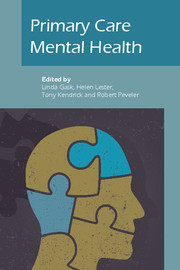Book contents
- Frontmatter
- Contents
- List of figures, tables and boxes
- List of contributors
- Preface
- Part I Conceptual basis and overarching themes
- Part II Clinical issues
- 8 Depression
- 9 Suicide and self-harm
- 10 Anxiety
- 11 Medically unexplained symptoms
- 12 Mental health problems in older people
- 13 Perinatal mental health
- 14 Child and adolescent mental health
- 15 Psychosis
- 16 Emergencies in primary care
- 17 Substance misuse
- 18 Management of alcohol problems
- 19 Eating disorders
- 20 Physical health of people with mental illness
- 21 Ethnic minorities
- 22 Asylum seekers and refugees
- 23 Sexual problems
- Part III Policy and practice
- Part IV Reflective practice
- Epilogue: Racing pigeons and rolling rocks: reflections on complex problems in primary care
- Index
20 - Physical health of people with mental illness
from Part II - Clinical issues
Published online by Cambridge University Press: 02 January 2018
- Frontmatter
- Contents
- List of figures, tables and boxes
- List of contributors
- Preface
- Part I Conceptual basis and overarching themes
- Part II Clinical issues
- 8 Depression
- 9 Suicide and self-harm
- 10 Anxiety
- 11 Medically unexplained symptoms
- 12 Mental health problems in older people
- 13 Perinatal mental health
- 14 Child and adolescent mental health
- 15 Psychosis
- 16 Emergencies in primary care
- 17 Substance misuse
- 18 Management of alcohol problems
- 19 Eating disorders
- 20 Physical health of people with mental illness
- 21 Ethnic minorities
- 22 Asylum seekers and refugees
- 23 Sexual problems
- Part III Policy and practice
- Part IV Reflective practice
- Epilogue: Racing pigeons and rolling rocks: reflections on complex problems in primary care
- Index
Summary
The physical healthcare of people with severe mental illness has probably never been of the highest quality and is a frequently neglected yet essential component of the holistic care of the person with mental illness (Peveler et al, 2000). The standardised mortality ratio is increased threefold in those with schizophrenia and life expectancy is reduced by 10–20 years (Brown et al, 2000). While the risk of suicide and traumatic death is increased 12-fold in people with schizophrenia, mortality associated with physical illness is also doubled and accounts for around 75% of all deaths of people with schizophrenia (Fig. 20.1). Cardiovascular disease is the most common cause, accounting for 30–50% of all deaths (Osborn et al, 2007). Mortality rates are also higher in those with depression, which is as strong a risk factor for cardiovascular disease as smoking (Yusuf et al, 2004). The reasons for excess physical illness include both genetic and environmental factors as well as disease-specific factors and treatment effects (Holt et al, 2004).
The National Institute for Health and Clinical Excellence (NICE) has placed the responsibility for the management of physical health within primary care and so an understanding of the scale of the problem, of the underlying aetiology and of the management strategies is important for all professionals caring for people with mental illness (NICE, 2002).
Cardiovascular disease
The increased rates of cardiovascular disease in people with mental illness present an important clinical problem. Much of the increased risk is explained by an excess of traditional cardiovascular risk factors but a direct effect of the mental illness cannot be excluded (Osborn et al, 2007).
Smoking rates are high in people with severe mental illness (Brown et al, 1999). Although dyslipidaemia has been less well studied in people with mental illness (Bushe & Paton, 2005), in people with chronic schizophrenia treated with phenothiazines, levels of high-density lipoprotein (HDL) cholesterol are lower and those of serum triglycerides higher than in normal controls (Sasaki et al, 1984). Antipsychotic drugs have a modest adverse effect on lipid profile. Low-density lipoprotein (LDL) cholesterol is increased with treatment, while HDL cholesterol is decreased, with little difference between drugs (Bushe & Paton, 2005).
- Type
- Chapter
- Information
- Primary Care Mental Health , pp. 296 - 307Publisher: Royal College of PsychiatristsPrint publication year: 2009

